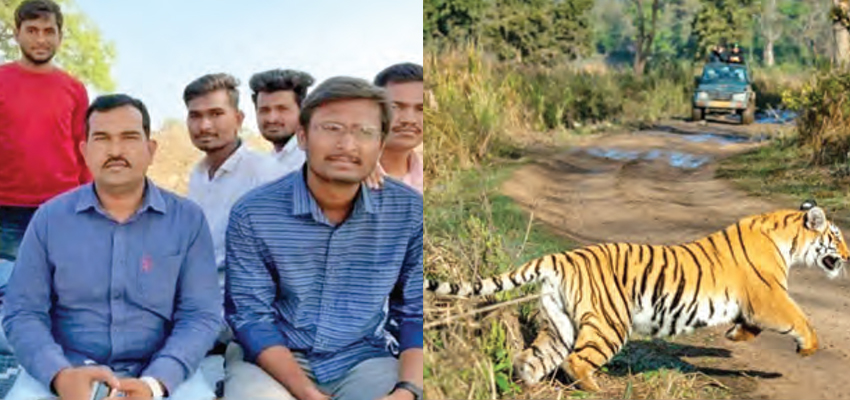
Corporate Citizen claps for the resourcefulness of bloggers in Maharashtra’s Kolgaon village, in Beed district, a region infamous for its farmer suicides.
Kolgaon has recently transformed into a blogger’s village, thanks to Akshay Raskar, the first villager who accidentally realised the power of Social Media. He has inspired many to rake in clean incomes via blog posts. They are yet to reach the top bloggers status but some 250+ bloggers including high school students and engineering graduates are bringing a change into their lives and generating additional income via blogging. They sometimes generate more income through their knowledge-led posts on farming in comparison to their actual farming proceeds. Many have created a sort of entrepreneurial platform where several bloggers collectively contribute relevant content and share the revenue. Akshay currently runs 8 individual blogs and 24 blogs as subdomains, employing village youths to contribute to his channels, via a 60:40 revenue split with them. Recently one of Akshay’s websites received 1,34,000 visitors, generating Rs 12,00,000 monthly income. It began with Akshay’s almost causal post a decade ago, which has encouraged entrants like Aditya Patil, an undergraduate B.Sc. student, and Saurabh, a farmer’s son. An SMS changed Akshay’s life, which beeped that his account had been credited with $222. It was a YouTube payment for a video he had uploaded in 2009 during his visit to Nashik. It was footage of a farmer who had unconventionally attached a plough onto the back of his bike. It amused Akshay who filmed the process and captioned it, ‘The Great Indian Jugaad’, uploaded it on YouTube just for fun, and forgot all about it until he received the dollar payment. He later started his YouTube channel @TechnicalSupportsbeed, posting relevant information on government decisions for farmers who had no means of accessing information about government schemes. He also runs a YouTube Channel @SikhoSikhao. Akshay’s success encouraged Saurabh and several villagers to blog as a livelihood means. Saurabh has been able to generate multiple incomes via blogging, farming, and teaching activities, resulting in his proud possessions of a sports bike and plot of land, and also transforming his mud house into a concrete structure. Aditya has been managing his blogging entrepreneurship with his studies, managing to earn an average of Rs 2,00,000 monthly. Kudos to Kolgaon’s inhabitants, who are alleviating their miseries, by honing the positives of a virtual world, often maligned for its dark activities!
Corporate Citizen slaps the irresponsibility of the Uttarakhand forest department, attached to the Corbett National Park, which according to the National Green Tribunal (NGT) violated laws for developing a tiger safari within the pristine precincts of the Corbett Tiger Reserve (CTR).
Not a new phenomenon, but this time greed overcame the larger motive for commercialisation without availing necessary permits, thus endangering wildlife. What is most appalling is the illegal layout plan in the Pakhro zone of CTR, spread across 106+ hectares, within the Lansdowne area of Pauri Garhwal, which would have behaved as an enclosed tiger safari ensuring “100% sightings” for the tourists to brag about. It would have defeated the very purpose of CTR, which is home to 230 tigers with the highest tiger density globally, at 14 tigers per hundred square kilometres in their natural habitat. The NGT panel, visiting the site earlier this year, found widespread evidence regarding the Forest Survey of India (FSI) estimates of 6,093 trees being illegally chopped to facilitate the Pakhru tiger safari project. “It is clear that the officers of Corbett National Park had scant respect for acts, rules, regulations and guidelines, and behaved most irresponsibly in the extant case,” said the NGT committee’s report. The widespread chopping of trees and illegal construction have caused irreversible damage to the original wildlife habitat. It includes illegal construction of administrative buildings, forest guest houses, and a residential complex for senior forest officials. Several committees have investigated the site since 2021, following a writ petition filed in Delhi. The committee also noted that illegal watering holes, elephant-proof walls, to prevent human-animal conflict, and other road constructions lack administrative and financial approval, without budgetary provisions. Thankfully, the panel has advised to remove the elephant walls to allow free wildlife movement in the Corbett national park zones. In its latest judgment, the safari project will commence but under the supervision of an official state government committee of experts, ensuring “due diligence” in framing further layout plans for the project.